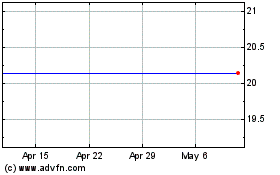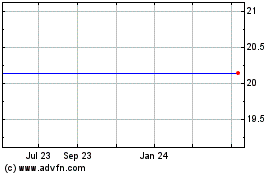By Amrith Ramkumar
Big banks earned billions of dollars in fees setting up
so-called blank-check companies in 2020, highlighting how booming
capital markets are helping Wall Street weather the
coronavirus.
U.S.-listed special-purpose acquisition companies, or SPACs,
raised $82 billion in 2020, a more-than-sixfold increase from the
year before and a figure greater than all of the money previously
raised, according to Dealogic. They even attracted a star-studded
group of backers, ranging from basketball legend Shaquille O'Neal
to former House of Representatives Speaker Paul Ryan.
As celebrities and well-known institutions entered the sector,
the biggest banks also increased their activity. Two -- Credit
Suisse Group AG and Citigroup Inc. -- together accounted for nearly
30% of the underwriting, followed by Goldman Sachs Group Inc.
A SPAC is a public firm that uses the money raised from an
initial public offering to merge with another company, typically
within a few years. That target company then gets the SPAC's
position on a stock exchange, allowing it to tap public markets.
The pandemic has sparked a record run, with hot startups in areas
such as electric vehicles and cannabis seeking to capitalize on
investors' burgeoning enthusiasm.
Banks find buyers for a company's shares and backstop the stock
price. In return, they typically get a fee of 2% of the money
raised in the initial listing, then another 3.5% when the company
completes its deal with the target. While those fees can be lower
than the money that banks raise in traditional IPOs, Wall Street
firms also can earn extra fees by advising a company on its SPAC
deal or raising more money for the purchase.
The whole process can result in a windfall, explaining in part
why the biggest firms on Wall Street are muscling into an area
previously dominated by a small group of players, analysts said.
Morgan Stanley, JPMorgan Chase & Co. and Bank of America Corp.
rose into the top 10 underwriters last year. Meanwhile, larger
firms Credit Suisse, Citigroup and Goldman wrested the lead in SPAC
underwriting from Cantor Fitzgerald & Co., which topped Wall
Street in the category the previous two years and fell to fourth in
2020.
The spree was part of a broader capital-markets bonanza, through
which companies issued huge amounts of equity and debt to make it
through the pandemic.
The rising underwriting fees have coupled with higher trading
revenue to help keep big banks profitable, even as they set aside
billions of dollars to cover future loan losses caused by the
economic slowdown. Some analysts expect SPACs to keep contributing
to that trend moving forward, driven by near-zero interest rates
and recent gains in companies that went public through SPACs,
including DraftKings Inc. and Virgin Galactic Holdings Inc.
"This has really been a very helpful shot in the arm for Wall
Street," said Michael Goldberg, head of U.S. equity capital markets
at RBC Capital Markets, a unit of Royal Bank of Canada.
Executives at Goldman and Citigroup cited rising underwriting
activity as a boost for their investment-banking businesses on
their most recent earnings calls in October. Investors will get a
look at how underwriting affected fourth-quarter profits when the
largest lenders begin reporting results next week.
Ultralow interest rates make SPACs more appealing to investors
by reducing the returns they can expect from safe assets like
government bonds, pushing them toward alternatives. Investors also
are drawn to SPACs because they have the option to redeem their
shares, plus interest, before a deal goes through. And blank-check
companies make it easier for startups to tout their long-term
growth projections, due to regulatory differences between SPACs and
traditional IPOs.
The surge in SPAC issuance highlights a reputational shift after
these firms were associated with penny-stock frauds and dismal
returns in the past. Their share of capital raised through all IPOs
doubled last year to nearly 50%.
"If you're an investment bank, you can't ignore that," said Doug
Adams, global co-head of equity capital markets at Citigroup.
Citigroup, UBS Group AG and Jefferies Financial Group Inc. were
the lead underwriters for hedge-fund billionaire William Ackman's
Pershing Square Tontine Holdings Ltd., which raised $4 billion last
July in the largest blank-check IPO to date. Other underwriters
included banks either owned or run by minorities, women or
veterans.
Citigroup also has led SPACs run by a former banker at the
company, Michael Klein. Mr. Klein's Churchill Capital Corp. has
created several SPACs, and his Churchill Capital Corp. III merged
with health-care company MultiPlan Inc. in an $11 billion deal last
summer. MultiPlan shares have tumbled after short seller Muddy
Waters Capital LLC in November said the company manipulated its
financial statements to mask a crumbling business. Short sellers
borrow stock, sell it, then attempt to buy it back at a lower
price. MultiPlan called the allegations false on its most recent
earnings call.
Credit Suisse, meanwhile, has been the sole underwriter for
SPACs led by former Facebook Inc. executive and venture capitalist
Chamath Palihapitiya. His first SPAC, Social Capital Hedosophia
Holdings Corp., in 2019 merged with Virgin Galactic to take the
space-tourism firm founded by British business mogul Richard
Branson public. Two of his other firms were among the largest SPACs
last year.
Virgin Galactic shares more than doubled in 2020, while
sports-betting firm DraftKings added 335%, adding to excitement in
the sector and pushing banks to bolster their SPAC businesses.
"Even the firms that wouldn't touch the product a couple of
years ago all of a sudden want to be part of the game," said Alysa
Craig, managing director for mergers and acquisitions and head of
SPACs at Stifel Financial Corp.
Deutsche Bank AG and Goldman were the underwriters of Diamond
Eagle Acquisition Corp., the SPAC that late in 2019 agreed to merge
with DraftKings. The executives behind Diamond Eagle, former MGM
Holdings Inc. movie studio chief Harry Sloan and film producer Jeff
Sagansky, said recently they aim to raise $1.5 billion for a new
SPAC called Spinning Eagle Acquisition Corp. If that company
doesn't use all of the money raised for an initial deal, it could
use some of the remaining funds to spin off a new SPAC and pursue
another deal.
Goldman is the sole underwriter for Spinning Eagle and has even
added to the flurry of activity by launching a pair of SPACs itself
in recent years.
"There's a growing acceptance of this way of going public," said
Carlos Alvarez, head of permanent capital solutions at UBS, the
sixth-largest SPAC underwriter last year.
Write to Amrith Ramkumar at amrith.ramkumar@wsj.com
(END) Dow Jones Newswires
January 05, 2021 05:44 ET (10:44 GMT)
Copyright (c) 2021 Dow Jones & Company, Inc.
Pershing Square Tontine (NYSE:PSTH)
Historical Stock Chart
From Dec 2024 to Jan 2025

Pershing Square Tontine (NYSE:PSTH)
Historical Stock Chart
From Jan 2024 to Jan 2025
